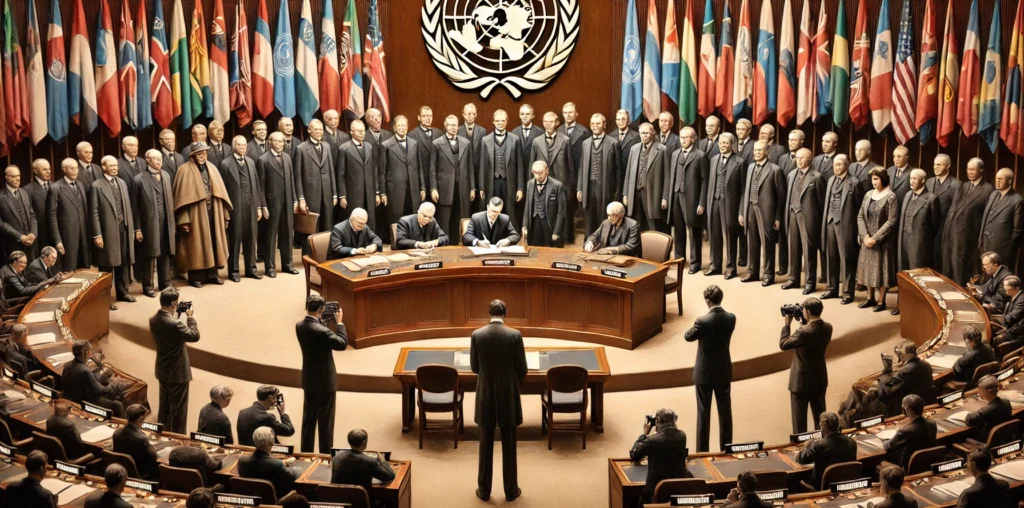Background: After the devastation of World War II, there was a global consensus that an international organization was needed to prevent future conflicts and promote peace and cooperation. The League of Nations, established after World War I, had failed to prevent World War II, highlighting the need for a stronger organization.
What Happened: The United Nations was officially established on October 24, 1945, following the ratification of the UN Charter by 51 countries, including the five permanent members of the Security Council: the United States, the Soviet Union, China, the United Kingdom, and France. The idea for the United Nations emerged during World War II, as the Allied powers recognized the need for a new international organization to prevent future conflicts and promote peace and cooperation. The League of Nations, created after World War I, had failed to prevent the outbreak of World War II, largely due to its lack of enforcement power and the absence of key nations, such as the United States. The groundwork for the United Nations was laid during several wartime conferences, including the 1943 Tehran Conference and the 1945 Yalta Conference. The San Francisco Conference, held in April 1945, was attended by representatives from 50 countries, who worked together to draft the UN Charter, outlining the goals, principles, and structure of the new organization. The charter emphasized the importance of maintaining international peace and security, promoting human rights, and fostering social and economic development. After the charter was signed on June 26, 1945, it was ratified by the necessary majority of signatories, and the United Nations officially came into being on October 24, 1945. The first meeting of the UN General Assembly took place in London in January 1946, marking the beginning of the organization’s efforts to address global challenges.
Impact for the Future: The United Nations has played a crucial role in maintaining international peace and security, addressing humanitarian crises, and promoting social and economic development. The UN has been instrumental in mediating conflicts, supporting decolonization efforts, and establishing international norms on issues like human rights, environmental protection, and disarmament. The UN continues to be a central platform for addressing global challenges, from climate change to pandemics.
United Nations Founded (October 24, 1945)
- Background: After the devastation of World War II, there was a global consensus that an international organization was needed to prevent future conflicts and promote peace and cooperation. The League of Nations, established after World War I, had failed to prevent World War II, highlighting the need for a stronger organization.
- What Happened: On October 24, 1945, the United Nations officially came into existence, following the ratification of the UN Charter by the majority of its signatories, including the five permanent members of the Security Council. The UN was created to promote peace, security, and cooperation among nations and to address international issues such as human rights and development.
- Impact for the Future: The United Nations has played a crucial role in maintaining international peace and security, addressing humanitarian crises, and promoting social and economic development. The UN has been instrumental in mediating conflicts, supporting decolonization efforts, and establishing international norms on issues like human rights, environmental protection, and disarmament. The UN continues to be a central platform for addressing global challenges, from climate change to pandemics.

